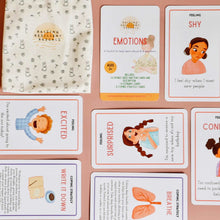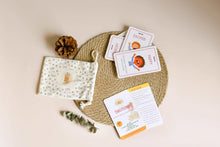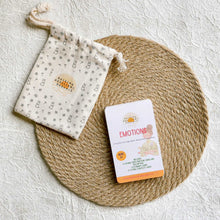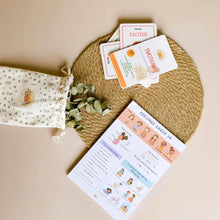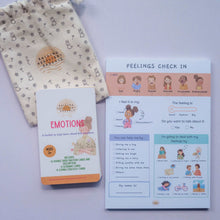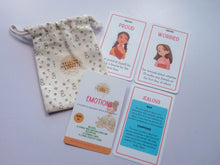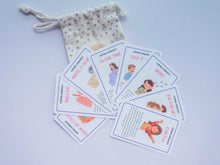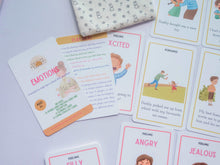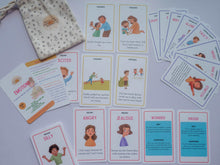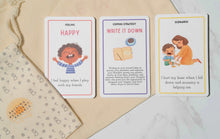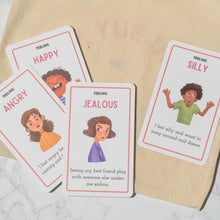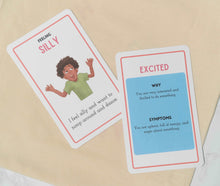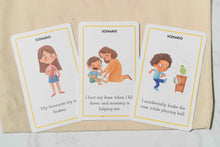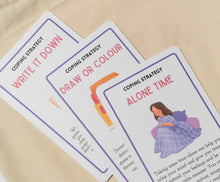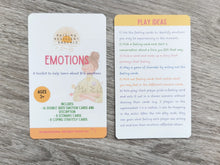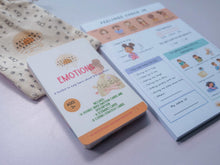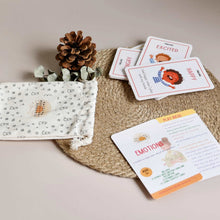
These aren’t your average flashcards. More Than Your Regular Emotion Cards are a thoughtfully designed tool to help children name, understand, and express their feelings in healthy, empathetic ways.
Building a Foundation of Self-awareness, Resilience and Confidence for Our Children
Teaching our children to identify, understand, and deal with their emotions and big feelings at a young age will help them grow to be mentally resilient, self aware, and confident. Children who can identify and understand their own and others' emotions are not only better at regulating their responses to strong emotions, and can also gauge a situation and respond appropriately. Self regulation (the ability to calm, relax, and soothe yourself) is also key in helping them build socio-emotional skills in their interaction with others. These tools will benefit them for a lifetime.
Building Emotional Resilience through Education
Our cards offer many fun and easy learning opportunities to encourage children to openly discuss and reflect upon their feelings. Use them as flash cards to teach children to identify and understand their feelings, role play with the scenario cards provided or alongside story books and real life situations!
What Each Set Includes
This set of fifty one 8 x 12cm flashcards includes 24 feeling cards with a description of the causes and symptoms of the feeling on each back, 18 coping strategies cards with details on how each strategy helps to manage response to emotions through a variety of relaxing and calming techniques with words of affirmation on each back, 8 scenario cards with words of affirmation on each back, and 1 card with play ideas
Printed on 350gsm art card with matte lamination with rounded corners. Please note that our refreshed packaging comes in a box and will no longer carry a drawstring pouch.
Also perfect for counsellors and teachers.
💛 More Than Your Regular Emotion Cards — FAQ
What are these emotion cards?
Our More Than Your Regular Emotion Cards are thoughtfully designed tools that go beyond “happy” and “sad.” They help children understand, name, and express a wide range of emotions in a safe and playful way. There are 3 types of cards - feeling cards, coping strategy cards, and scenario cards. Each feeling card is paired with explanation on how it feels in your body and why you feel that way, helping children better identify their feelings. The coping strategy cards provide a trove of ways for children to deal with their feelings that best suit them. Scenario cards offer an opportunity to discuss real situations and how it may make them feel, and what they can do. Together with a guide card with tips on how to use these cards, affirmations, and practical strategies, this deck helps to support emotional literacy and resilience.
What ages are these suitable for?
Recommended for ages 3 and up, but can be introduced earlier with adult guidance. Great for preschoolers, primary-aged kids, and even older children who need emotional support tools.
What makes these cards “more than regular”?
Most emotion cards just label facial expressions. Ours go further:
-
✨ Emotion name + facial cue + symptoms
-
💬 Prompting questions to spark conversation
-
🧠 Regulation tips for calming or coping
-
🫶 Self-kindness messages and affirmations
It’s not just about naming the feeling — it’s about understanding, processing, and nurturing self-awareness.
How do I use them with my child?
You can:
-
Use them as a daily check-in
-
Support your child during meltdowns or conflicts
-
Reflect on past situations together
-
Build an emotion vocabulary slowly and gently
They also work beautifully in classrooms, therapy sessions, or homeschooling settings.
How do these support child development?
They promote:
-
Emotional regulation
-
Empathy and communication
-
Cognitive processing of experiences
-
Connection and trust between caregiver and child
What’s included in the set?
Each set includes beautifully illustrated cards on sturdy material, featuring diverse characters and emotions like proud, left out, worried, excited, curious, and more — not just the basics. They also include a wide variety of strategies such as simpler ones like counting and drawing to more complicated ones like building a vision board, and 5,4,3,2,1.
Why are emotional tools important for kids?
Children who learn to understand and express their feelings grow into resilient, kind, and self-aware adults. These cards give them the vocabulary and space to process what’s happening inside — especially in a world that moves fast and often skips over emotions.
✨ Quick Summary
If you want a tool that helps your child become emotionally literate, expressive, and resilient, these cards are more than just cute — they’re a whole-hearted step toward lifelong emotional well-being.

















